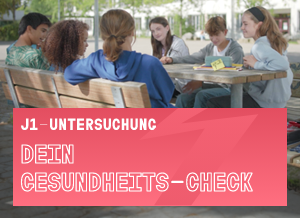The J1 examination - health check in adolescence
At the age of 12 to 14, your child is once again entitled to a free early detection examination, the J1, which is a good opportunity to receive confidential advice.

The adolescent health check (J1) can be carried out between the ages of 12 and 14. After a protracted period of time since the final U examination, it offers a good opportunity to check general state of health, vaccination status and puberty development. It is also a confidential advisory service for young people.
When and where is the J1 done?
Most young people have the J1 at the age of 13. However, this examination is also free of charge for those with statutory health insurance one year below and one year above this age! As soon as your child turns 12, you or your child can arrange a J1 appointment at a child and adolescent medical practice. Make sure you encourage your son or daughter to have this important health check!
Your child can also go to a general practice, including if there is no child and adolescent medical practice nearby.
WHEN TO ATTEND THE J1?
What gets assessed?
The J1 includes a physical examination, a vaccination status check and a confidential discussion on issues that might currently be concerning your child: any skin problems, weight problems and eating disorders, though also drugs and any difficulties at home or with friends, sexuality and contraception. Young people are often given a questionnaire in advance, which they should complete and bring with them to the examination. NB Everything is confidential and stays between your child and the doctor. Even though your child is still a minor, the J1 health check is subject to the medical duty of confidentiality.
However, if the examination reveals a serious illness, you as parents will of course be informed.
Why is the J1 particularly important for young people?
Adolescence involves plenty of changes. These changes relate to physical development (e.g. growth), psychological and social development and hormonal changes that can greatly alter body image. Adolescents often have personal questions or concerns that they can discuss at the examination. As parents, you can also talk about what is bothering or worrying you. You will usually be given a questionnaire to fill out in the waiting room. At the J1, certain metabolic diseases (e.g. thyroid) or spinal function are also checked physically. This is important at this age in order to be able to treat any changes at an early stage.
Bring to the appointment
- the insurance card of the health insurance company,
- the vaccination record,
- the yellow child examination booklet (if available, but not mandatory),
- the completed questionnaire, if this was sent in advance.


